Interview with Patrick Chaplin
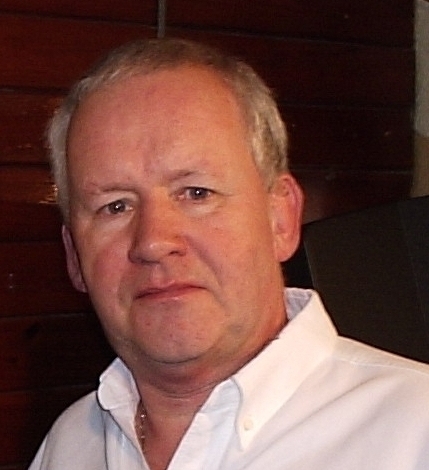
Patrick Chaplin - or strictly speaking Dr. Patrick Chaplin - is the leading darts historian of the world and the only one with a really hard earned doctor's degree in this field. For Chaplin the involvement in the history of the sport of darts began 30 years ago as a hobby. By now it is passion and vocation.
Patrick Chaplin wrote several books about darts among those "The Official Bar Guide to Darts" in 2010, "180! - Fascinating Darts Facts in 2012, his dissertation "Darts in England 1900 - 1939: A Social History" in 2006 and at the moment he works at a new book which will be published this year with the title "Skills, Technique, Tactics". Beside he was the co-author of the biographies of John Lowe, Trina Gulliver and Bobby George. Chaplin has his own website and every month he publishes the DDN (Dr. Dart's Newsletter) to which you can subscribe on his site. Beside his work as an author he is research fellow (guest) at the Anglia Ruskin University in Cambridge where he did his doctorate.
Through the work on my site and while attempting to find out more about the history of darts in Germany I got into contact with Patrick Chaplin several years ago. During the Winmau World Masters in Hull I finally met him and his wife in person and thereby the following interview came up.
Patrick, do you yourself play darts and, if so, how good are you?
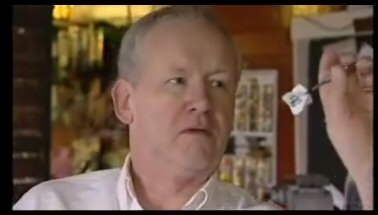
I started playing darts when I was about 12 years old and yes - I still play. I would say I am an average pub player. I was improving but then I suffered from dartitis which ended any ambitions I may have had.However, I now play reasonably well again but only with friends at my local pub.
What is your professional background?
I worked for the Essex County Council for many years, as both a finance officer administrator, mainly in the Community Education (Adult and Youth Service) within the field of education. When I was given the opportunity I retired atthe age of 54 when I became more involved in darts history and writing books both on my own and with star darts players including John Lowe, Bobby George and Trina Gulliver.
At first my wife still worked and everything was fine. Now she's retired too which makes it a little bit more difficult. I wouldn't be able to live from my books alone...
How did you become interested in darts history?
It all started when I introduced a Newsletter for my pub team, the Blue Boar, Maldon, the town in which I live. Besides match reports, I added small pieces of gossip, tittle-tattle and citations from Derek Brown`s The Guinness Book of Darts. It turned out that the players liked the historical bits. One day a friend of mine asked me what the real history of darts was. I replied, "Give me two weeks and I'll find out for you." That was back in 1985 and, seven books and a PhD later, I'm still working on it! My PhD was awarded to me by the Anglia Ruskin University, Cambridge in 2006 for my dissertation Darts in England 1900-1939: A Social History. That was tough. When I started to write my dissertation it was not easy. Of course I had to adopt an academic approach to my writing which was something very alien to me but I managed it in the end.
Was there somebody before you who tried to collect this kind of information?
To be honest, only Derek Brown, a sports and darts writer for the Daily Mirror had undertaken any serious research and published most of it in The Guinness Book of Darts in 1981. That was really my start. I worked from there whilst also looking at back issues of Darts World magazine and the handful of other darts books that had been published in England since the 1930s, most of which included nothing whatsoever about darts history. The rest of the information was found in hundreds of other documents and locations throughout Britain and even parts of Europe.
And what about other countries?
Dan William Peek has made a great effort to trace the history of darts in America. His discoveries were published in 2001 but no one over there has applied academic rigor to the subject and, at the moment, sadly, it doesn't look as though anybody will.
There is very little written about the history of darts in other countries.
How difficult is the research?
When I set out in search of the history of darts back in the mid-1980s research was extremely difficult. Sources were extremely limited. The fact is that no one else had trodden that path before and where some had been they had produced numerous myths about darts, myths that I had to look into to reveal the true facts.
What are your main sources? And are there any sources at all?
The sources existed but were very well hidden, much of it in brewery archives, local and national newspapers, journal and magazine articles, books, patents, ephemera and printed matter, correspondence and interviews.
One of the most important sources was interviews with people who were there when the modern era of darts began in the 1930s and 1940s. John Ross was an extremely valuable contemporary witness - he started to play in 1920 and was involved in darts organisation for decades. There was little evidence relating to darts manufacture in England as many records had been destroyed but I was eventually able to reconstruct the history of darts and dartboard production in England, especially the East End of London.
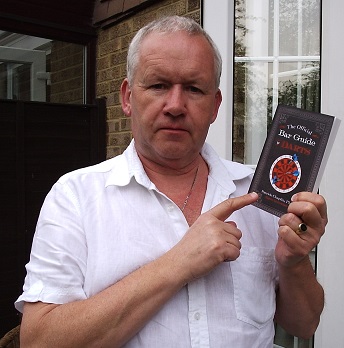
And all those clubs and pub teams?
Some of them have really been around for a very long time but sadly either they don't have any records. It seems that, as the new board or committee was formed the predecessors left no paper trail. Much simply disappeared. It often depends on the interest people have in history. There are clubs which even keep old score sheets which go back years but they are the exception.
How much do people still remember?
In my research, talking to players and those involved in darts organisation is vital. People like Olly Croft, ex-top man at the British Darts Organisation (BDO), and, for example, Doug McCarthy, ex-England international. These men have memories going way back and can help me piece the history of the sport together. I also learned a lot from Frank Wolfe who used to produce a darts newspaper called The Dart back in the 1940s. I cannot over emphasise how important it is to talk to these people before they are lost to time.
Do you feel people are interested?
People in darts are always willing to talk to me. Much of my research now appears in my monthly free online Dr. Darts' Newsletter (DDN)which is sent to darts fans in over 90 countries. I receive a lot of feedback and questions from that and via my website. But in the main, people who do not follow darts are not that interested in the sport. But then I cannot criticise them as football holds no interest to me!Do people turn up with some knowledge or only with their questions?
I receive both, information and questions, and often people's reaction to DDN articles. And sometimes I even receive suggestions for new articles.
Do you think interest in darts history is growing? And might be the awareness how important it can be to write things down?
My answer to this has to be "Yes" although I sometimes wonder what the situation would be today if I had not set out on my research back in the 1980s. And I would say that of course my website and DDN play a vital role in passing on my discoveries to darts fans.
May be so little was recorded because most people just thought about darts as fun?
To be sure that is one of the reasons. But there are more. The sport of darts was totally disregarded by academics and scientists and rejected as just a working class thing until, that is, I began my work which led to my being awarded a PhD in the subject in 2006. But I would suggest that only a small number of darts players and fans are interested in the actual history of our sport. Mind you, my books sell fairly well so perhaps I'm wrong about that!Would you define darts as a sport?
I would say that really depends on which level you play. You can look at it as a game you can play with friends in a pub just for fun. But when you look at it on the professional level I would define it as a sport.But what is absolutely certain is that darts has something special and it's fun and a very sociable activity. Everybody can play it on whatever level he or she chooses.
Has it always been a sport?
No. For years darts was a workingman's pastime: a pub game but the BDO in the 1970s changed all that. Darts began to be taken seriously and was eventually recognised as a sport by the Sports Council's in the UK in 2005. What exactly that has achieved in the long term is debatable. What is known is that the growth of the professional game via the Professional Darts Corporation (PDC) has enabled the sport to develop beyond anything we may have imagined back in the 1980s.
Can you imagine it darts will really one day be part of the Olympics?
No - I can't imagine it. There was one big chance - the Olympics in London but for whatever reason(s) (possibly the time factor) the World Darts Federation (WDF) failed. That was the one opportunity to present darts as a demonstration sport in the country and the city where it all began. No, we'll never see darts in the Olympics.
However, the Paralympics is a different story. I can see darts being featured there in the not-too-distant future. When I look at Russ Strobel and what he has already achieved so far with the World Disability Darts Association (WDDA) I can certainly see darts in the Paralympics sooner rather than later. I am one of a number of Administrators for the WDDA and will do everything I can to help the WDDA achieve their ambitions.
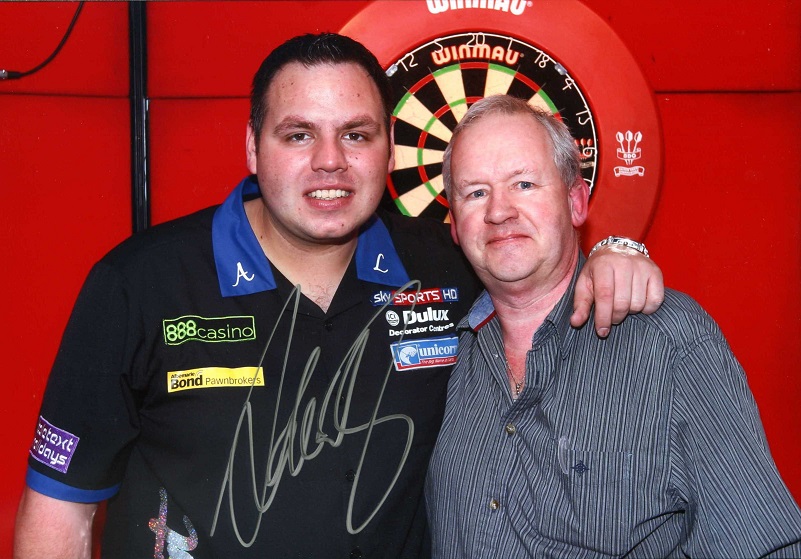
What do you regard as the biggest changes in darts?
The first major shift for darts was in 1924 when the brewers, licensees and darts organisers saw the benefits of setting up the National Darts Association (NDA) to control the sport and define rules. Later in 1954 a new organisation (the National Darts Association of Great Britain (NDAGB)) took charge for a couple of decades but by the late 1960s it was in decline.
Then of course the BDO was set up in London by Olly Croft and his colleagues and that set the ball rolling. Everything that has happened in the modern era of darts would not have stood a chance if it was not for the BDO. From then on darts was made. It was also made for television and the split-screen technology made it possible for fans to watch a dart being thrown and hitting the dartboard at the same time. From the late 1970s to the late 1980s darts never seemed to be off of our screens here in the UK. But it was not only the split screen technique which made darts much more interesting on TV. Informed and entertaining commentators including Dave Lanning, Sid Waddell and John Gwynne played an important part too.
Then came the World Darts Council in 1992 (later the PDC) which resurrected the, by then, failing sport of darts. Sixteen brave darters broke away from the BDO and sent the sport into transition. The PDC introduced razzmatazz, walk-on music, walk-on girls,bright, flashing lights and, it seems, audience participation but more than that, the organisation introduced a direct focus on the professional darts player.
When you look at the newspapers - there darts is still no issue at all.
Darts coverage in the newspapers was much more widespread in the 1970s and early 1980s with a good number of national newspapers in the UK running darts columns which brought fans up to date with what was going on in the sport. Back then the News of the WorldIndividual Darts tournament was still around so that newspaper continued to regularly report on its competition but that ceased in the 1990s.
There is still good coverage in the tabloid press. But today I think most of the "serious" newspapers still see darts as some kind of workingmen's amusement and don't report on it.
Women's darts still doesn't seem to be recognized.
I can't explain it myself.Watching the Lakeside World Championships and the World Masters in 2014 there were some fantastic women's matches. Deta Hedman and Anastasia Dobromyslova were brilliant and consistently so.
Women's darts has been around for a long, long time. There were ladies leagues as early as the 1930s but somehow the women's game has never attracted the attention of the fans or, perhaps more importantly, the sponsors. It's not sexist thing but more I think of the women's game being compared too closely to the much higher scoring standards of the men's game. While that attitude persists then promotion of the women's game will always have problems. However, having said that the Ladies Darts Association (LDA) are working hard in the UK and in parts of Europe to change all that. I wish them well as I sincerely believe that the ladies darts deserve to be better recognised as a thriving sport with great potential.
Who would be the first women darts champion you know of?
Ever since the News of the World darts championship began in the late 1920s, women were allowed to enter the competition but rarely made the final stages. The first exception to this was Miss Eileen Turnage of Witham, Essex, England who made the last eight in an Area News of the World final in May 1936.
The first woman to make it through the Grand Final of the News of the World tournament was Mrs. Morgan of The Old House at Home pub at Colden Common, Hampshire, who won the Winchester Area final in April 1937 and went through to the Grand Finals in London. These took place in June that same year where Mrs. Morgan took on the thirty-one other Area finalists. Regrettably she was knocked out in the first round but, of course, had made darts history.
The biggest female darts star of the 1970s and 1980s was undoubtedly Stoke's Maureen Flowers but since then there have been numerous big names in women's darts, probably the biggest being ninetimes world champion Trina Gulliver.
Has darts been always been more of an adult entertainment?
No. Although darts in one form or another has been played in English pubs for many years, at one stage at the turn of the twentieth century it was more popular as a children's or family parlour game. It was also to be found in fairgrounds across the country. It's popularity as an adult pub game really only gained momentum after the Great War.
Would you say young people are still interested today?
Yes, increasingly so but mainly as spectators and viewers than actual players. There are a lot of young people attending the various darts academies up and down the UK so that ensures a good supply of excellent young players in the future, that and those coming up through the ranks via the BDO. Regrettably in many cases darts is still perceived as an old person's sport which, of course, it isn't.
One often hears that the typical pub with dartboard is on decline - is that true?
It's not really true - at least not everywhere. Where I live you still can still find a good number of dartboards in many local pubs with thriving leagues. But over the past three or four decades the whole nature of the pub in Britain has changed with a focus away from merely drinking and playing pub games to provision for eating and for families. Today families with kids go there to eat. It's no longer as much a place for recreation. But fortunately, as I said, there are still a lot of dartboards around in pubs but in some cases they are very hard to find!
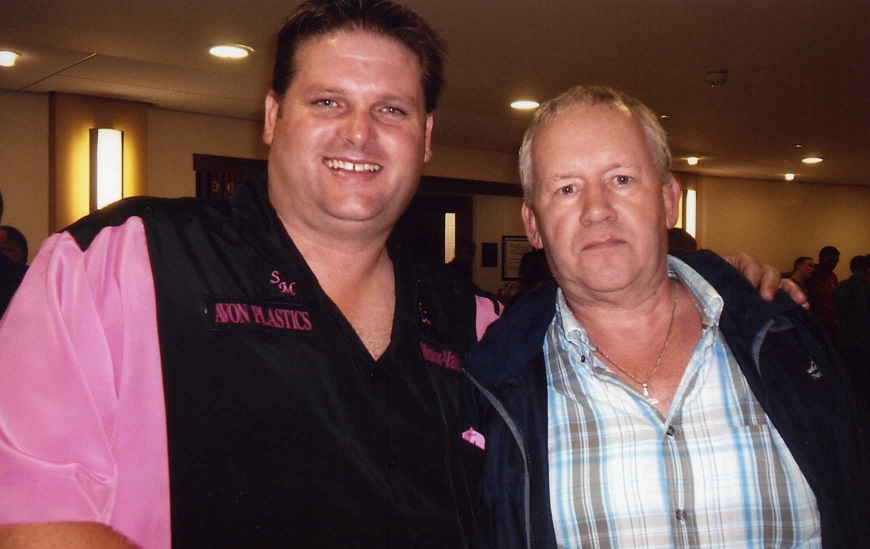
Something else which has caught my eye is that a lot of people love to watch darts but don't want play...
That's true. Usually you still find people at Lakeside who are purists, real devotees, who love to watch the darts and appreciate the skills of the players as they probably play darts themselves. With the PDC (more than the BDO) the emphasis is on entertainment and having a great time. Spectators nowadays don't always appreciate the actual play and fail to give 'best of order' whilst players are at the oche. They are there to party. To an extent darts is turning into a spectator sport; just like football where the fans watch but don't actually play.
What would you think how important soft-darts will be in the future?
I can't imagine it has much of a future in the UK although I am prepared to be proved wrong on this. Here in the UK we do not expect to have to pay to play but that might change. (Did you know that one of the first electronic darts machines was patented by two Englishmen?) Certainly DARTSLIVE are making some progressing with electronic/soft-tip darts in some major cities in the UK.
When you look at the global development - which might be an upcoming darts nation, even might be a threat to British predominance?
That's a very difficult question. Holland has certainly become a top darts nation since the late 1990s and Barney's back-to-back Embassy World Championship wins. At one stage it looked India might develop into a top darting nation but that enthusiasm seems to have slowed of late. Now everybody seems to be talking about Asia - especially Japan. Of course it might happen there, soft-tip darts is huge in Japan yet many darters play both steel dart and soft dart.
Is darts played more or less globally today?
Yes. Although the World Darts Federation (WDF) boasts over 60 member countries and the PDC is making great strides with top competitions around the world, I have the impression that there are many countries that are simply not interested in organised darts, preferring to simply play for pleasure, which is not, in my opinion a bad thing. As long as people are playing and enjoying darts then that is fine with me.
And how did it become widespread?
Although some countries outside of the UK were playing darts before World War II the global development of darts only really began after 1945. American, Canadian, Australian, New Zealand and other servicemen and women formerly stationed in the UK took the game home with them whilst ex-patriots who remained in countries, for example, in Europe, set up British Legion clubs which would have always featured darts.
Although both the BDO and the WDF have played a vital role in promoting darts globally, I believe that, more than any other individual, the man responsible for spreading the word of darts across the planet for the past forty or more years (and continuing to do so to this very day) is the globe-trotting darts entrepreneur, Dr. Eddie Norman.
What is your prediction of the future of darts?
That is a difficult question to answer. Darts will always be played to a greater or lesser extent in pubs in the UK. But as for darts on television, I think the viewing public may become fed up with the same kind of format and, usually, the same faces. I would like to see 501 increased to 701 so that it sets new targets for the players. Nine-darters are so common these days that fans are disappointed if at least one is not scored in a major tournament.
As far as darts organisations are concerned, the PDC has led the way now for a long time which has left the BDO in its shadow. But the BDO will survive as it is still directly involved with the majority of the County organisations and serves both women's and youth darts well. However, if the English Darts Organisation (EDO) continues to progress the way it is fans might begin to wonder what there is left for the BDO to do, given that the rest of the UK (Scotland, Wales and Northern Ireland) already have their long-established darts organisations.
As for the World Darts Federation (WDF), which alleges to promote and support darts globally, I'm not so sure. The next few years might by telling on the WDF.
The PDC caters exclusively for the professionals and what the future holds for that organisation will depend on for how much longer the fans will be prepared to pay good money to watch more or less, give or take a face or two, the same darters competing against each other. Maybe the TV companies will tire of darts as they all did back in the late 1980s. I sincerely hope not. The telling point for the PDC will be when both Phil Taylor and Barry Hearn retire at the same time: something Taylor is very clear about in his latest, rather disappointing, book.
What I do see is an extremely bright future for the World Disability Darts Association (WDDA) which has achieved so much during the past two years, including being recognised by the WDF and receiving sponsorship and support from the WINMAU Dartboard Co. Ltd. Darts for the handicapped has a bright future.
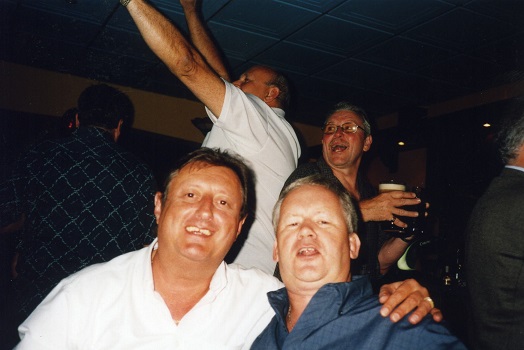
As you have been involved in the sport for a long time, do you have some kind of all-time favourite darts player?
I have two. The first is Bobby George, the dartsman of the people and for the people. He is a British institution and has done more for darts, both in terms of his own personal success and skills and as an entertainer. Given his nearly forty years as a top darts player it's still hard to believe that the sport he loves above all others is fishing!
My second all-time favourite darts player has to be Eric Bristow. He was so much a part of bringing darts to the masses and popularising it during the late 1970s and 80s. It is my view that without entertaining and controversial characters like Eric, the sport of darts would not have stood much of a chance for longevity as a televised sport.
As for the women's game, there can be only one name put forward as my all-time favourite lady player and that, of course, is Trina Gulliver MBE.
Of the current crop of darters, I admire the skills of Jamie Caven, a man who has overcome adversity, being diabetic and blind in one eye, to become a top PDC darts player.
And who would you say is the most popular player past and present?
Everyone either loved or hated Eric Bristow so his role in darts can never be underestimated. Jocky Wilson was extremely popular not only because of his unusual throwing action and his undoubted skills but also because he was such a character.
Today the sport lacks characters, mainly because there is so much money around that players cannot afford to fool around on stage. Wayne Mardle was probably the last real character on the oche although Scotland's Peter Wright can take your breath away with his colourful outfits and hair-dos but after his intro he ensures that his darts do the talking.
Of course, Phil Taylor is the most successful player ever (so far) but then that wasn't the question you were asking...
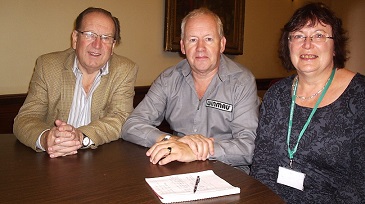
The pictures were kindly provided by Dr.Patrick Chaplin